The capital markets are in the midst of a profound transformation, driven by the rapid advancements and widespread adoption of Generative AI (GenAI). This isn't just another tech upgrade; it's a fundamental shift reshaping how financial institutions manage risk, ensure compliance, and execute post-trade operations.
North America is at the forefront of this transformation, capturing 41% of global generative AI revenues in 2024 and maintaining its position as the dominant region for GenAI innovation and adoption.
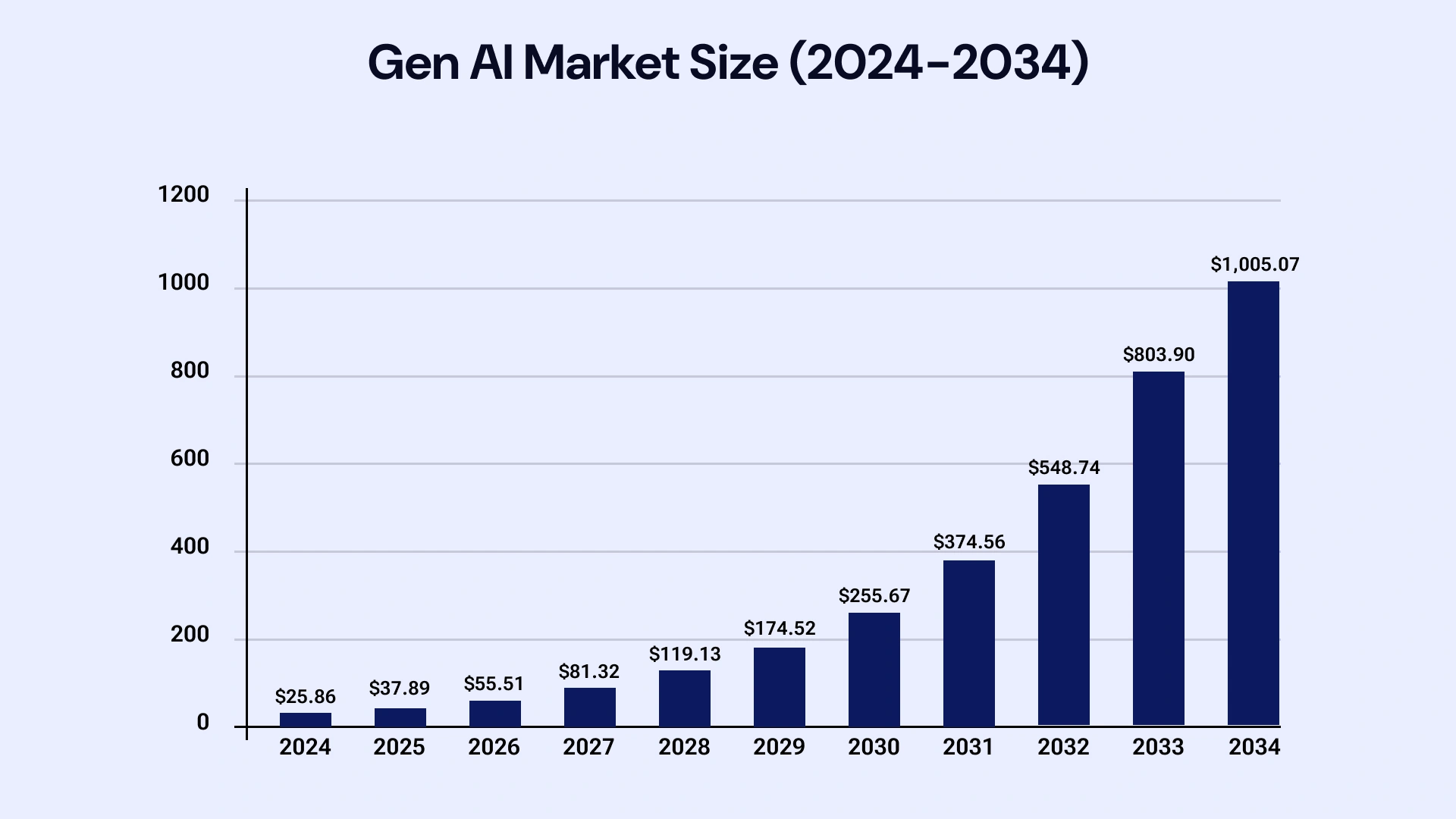
This momentum is undeniable: industry surveys show over 65% of financial services firms in the US and Canada currently have at least one GenAI project underway, a figure projected to reach over 90% among large enterprises within the next year, as the technology matures and becomes integral to capital markets infrastructure.
Despite this rapid adoption, many firms remain burdened by legacy systems, leading to inefficiencies across risk management, regulatory compliance, and post-trade operations. As the pace and volume of trading and regulations intensify, institutions often struggle to keep up, frequently spending as much as 70% of their post-trade processing efforts on manual error resolution, reconciliations, and compliance documentation.
This is where Generative AI in capital markets steps in as a transformative solution.
Generative AI in capital markets automates routine processes, detects risks previously invisible to traditional systems, and dramatically boosts AI-powered operational efficiency. In this blog, we'll delve into how AI in financial services is addressing real business challenges, delivering measurable ROI, and outlining what you need to know to lead the market in risk, compliance, and post-trade innovation.
Generative AI’s Role in Financial Operations
GenAI represents a significant leap forward from rule-based bots and earlier AI models. While traditional AI in finance industry processed structured, tabular data and simple transactions, GenAI utilizes large language models (LLMs) and can comprehend, extract, and generate new content from unstructured sources, such as contracts, emails, regulations, and voice records.
To truly appreciate the power of GenAI, it's essential to understand how AI has been used in finance traditionally and how GenAI extends these capabilities:
Traditional AI in Finance:
- Automation: Primarily focused on robotic process automation (RPA) for repetitive, rule-based tasks.
- Pattern Analysis: Utilized statistical anomaly detection for issues like fraud and trading irregularities, typically on structured data.
- Data Handling: Provided predefined responses for customer service inquiries.
GenAI goes further, unlocking new frontiers:
- Report Generation: It can draft comprehensive compliance reports tailored to specific jurisdictional needs, synthesizing vast amounts of information.
- Complex Pattern Detection: GenAI excels at surfacing intricate fraud schemes, identifying potential insider trading, or uncovering sophisticated financial crime risks that traditional systems might miss.
- Unstructured Data Mastery: Its ability to interpret, extract, and generate actionable information from scanned documents, emails, and free-form trade confirmations is a game-changer, addressing a major pain point in financial operations.
GenAI for risk management and AI-driven regulatory reporting are transforming workflows by automating labor-intensive processes. The best large language models (LLMs) in finance enable deep understanding, summarization, and compliance interpretation at a scale and speed previously unimaginable.
Key Strengths of GenAI in Capital Markets:
- Unparalleled Information Synthesis: It can quickly process and connect disparate pieces of information from various sources.
- AI-driven post-trade automation: Streamlines and accelerates traditionally manual and complex post-trade processes.
- Proactive Risk Mitigation through Continuous Learning: GenAI models continuously learn and adapt, enhancing their ability to identify and address emerging risks.
- Automated, Accurate Regulatory Filings Enhancing Compliance Speed: Reduces the time and effort involved in regulatory submissions while improving accuracy.
Transforming Risk Management with GenAI in the Capital Market
Modern risk management is about vigilance and foresight. AI in risk and compliance offers new capabilities that were previously unthinkable, fundamentally changing how financial institutions identify, assess, and mitigate risks.
GenAI Use Cases in Finance Risk Management
GenAI use cases in finance risk management are diverse and impactful, moving beyond mere detection to proactive prevention:
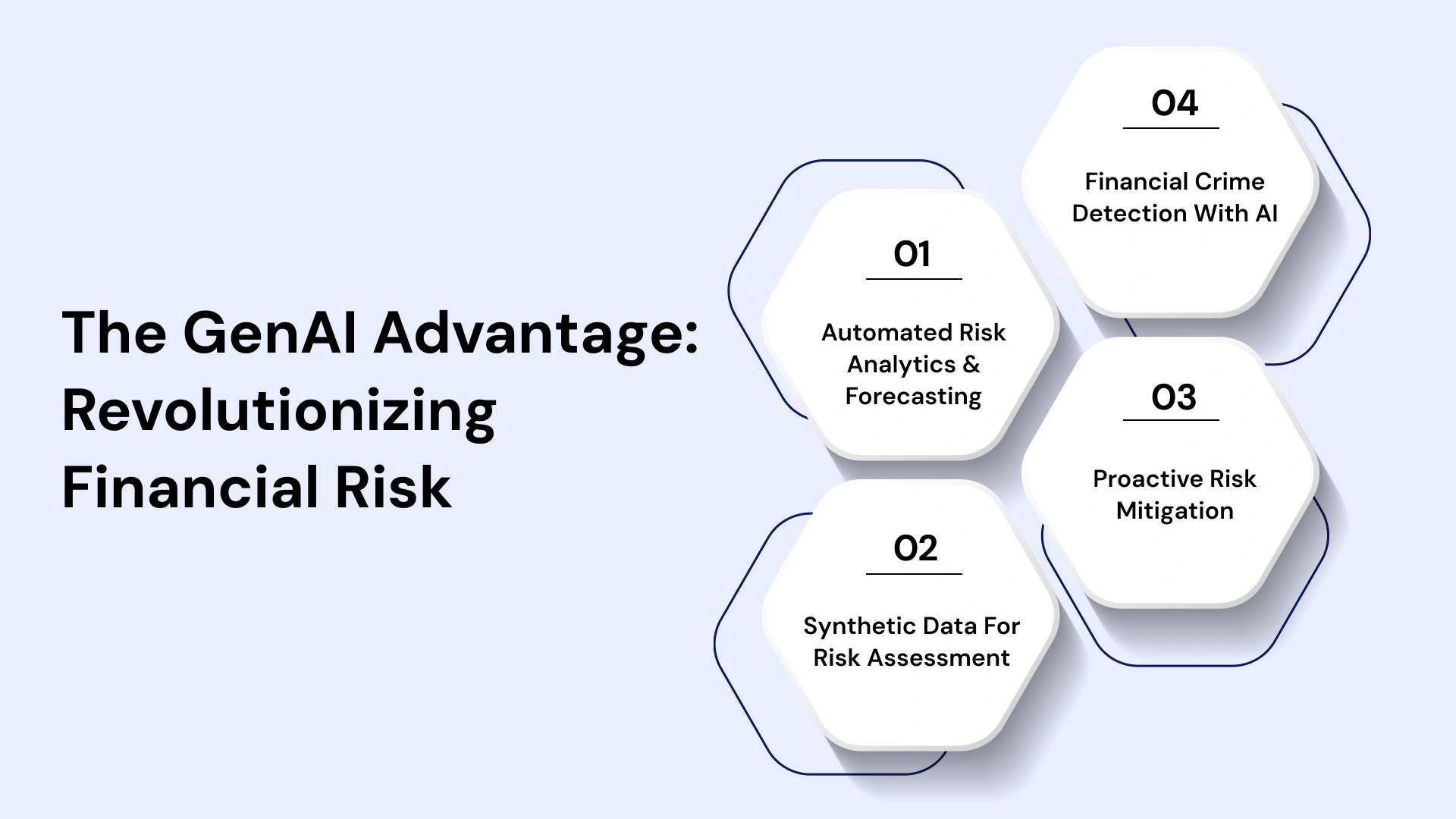
- Automated Risk Analytics & Forecasting: GenAI enables real-time risk assessment and portfolio stress-testing using constantly updated data sources. It can analyze market movements, geopolitical events, and even social media sentiment to provide more comprehensive risk profiles.
- Synthetic Data for Risk Assessment: A crucial application, GenAI can generate privacy-compliant, realistic simulated data. This synthetic data is invaluable for robust model validation, simulating rare but high-impact events (e.g., market crashes), and conducting comprehensive scenario testing without exposing sensitive real-world information.
- Proactive Risk Mitigation: Instead of reacting to incidents, AI in risk management models alerts teams to emerging risks, such as nascent market instabilities, evolving credit exposure, or sophisticated cybersecurity threats, before they escalate into significant losses.
- Financial Crime Detection with AI: The laborious process of routine reviews for suspicious activities is replaced by automatic anomaly and outlier detection. Generative AI for financial risk assessment vastly improves accuracy and response times in identifying fraud, money laundering, and other illicit economic activities.
GenAI Risk Capabilities
| Capability | How GenAI Delivers |
| Scenario Analysis | Simulates hundreds of complex risk scenarios using both synthetic and real-world data, exploring a wider range of possibilities. |
| Real-Time Scoring | Provides continuous risk assessment as new trades are executed, exposures are booked, and market conditions shift. |
| Automated Regulatory Reporting | Drafts and files real-time risk reports, automatically adapting to fit evolving compliance mandates and formats. |
| Anomaly & Fraud Detection | Surfaces subtle yet suspicious patterns, reacting faster and with greater precision than human agents or traditional rule-based systems. |
| Deep Policy Analysis | Digests and explains new regulations, legal precedents, and internal policies, converting them into actionable rules for automated systems. |
With GenAI for financial risk assessment, institutions actively defend their portfolios and reputations. This transforms risk management from a reactive obligation to a proactive strategic advantage, offering a level of foresight and control previously unattainable.
Enhancing Regulatory Compliance with AI in the Capital Market
Adapting to the relentless and ever-evolving regulations in capital markets is a constant challenge. AI for compliance in banking is no longer a niche technology; it has become a boardroom priority, essential for navigating the complex web of global financial regulations.
Streamlined Compliance Processes
Generative AI in regulatory compliance is revolutionizing how financial institutions manage their obligations:
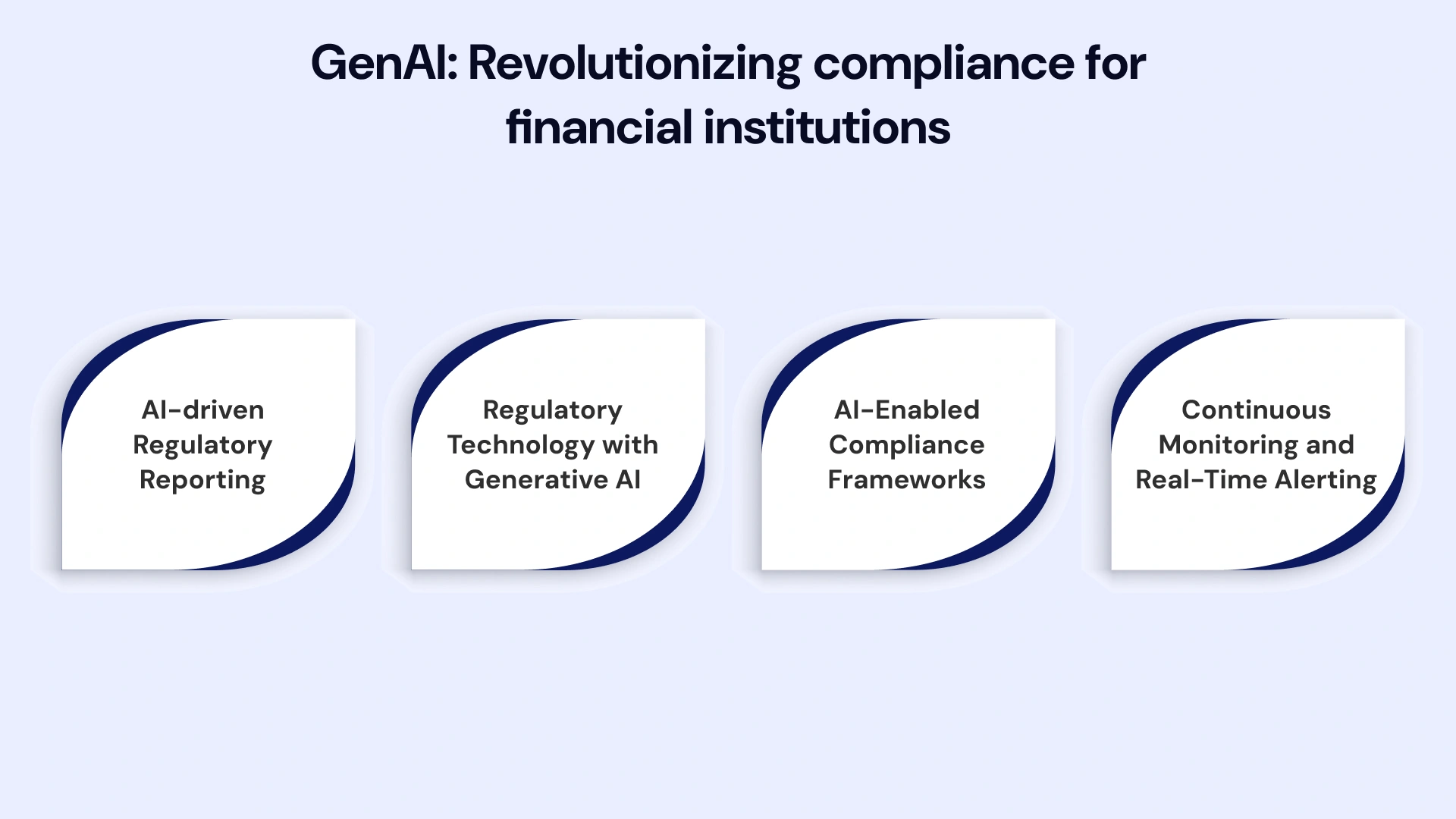
- AI-driven Regulatory Reporting: GenAI automates the collection, structuring, and submission of complex filings. It can process disparate data sources, reconcile inconsistencies, and generate reports in seconds, automatically and precisely supporting multi-jurisdictional compliance.
- Regulatory Technology with Generative AI (RegTech): AI-powered RegTech solutions proactively scan new rulebooks, legislative updates, and enforcement actions to stay ahead of regulatory changes. They flag potential impacts for legal and compliance teams and even suggest necessary updates to internal procedures and controls, dramatically reducing manual research time.
- AI-Enabled Compliance Frameworks: These frameworks are continually updated by live feedback from regulatory bodies, market activity, and internal audit findings. This minimizes the lag between new regulations and their internal implementation, ensuring continuous adherence.
- Continuous Monitoring and Real-Time Alerting: GenAI-powered systems enable continuous surveillance of transactions, employee communications, and market activities for potential regulatory breaches or suspicious patterns. By leveraging advanced natural language processing and pattern recognition, these platforms instantly flag anomalies, send real-time alerts to compliance officers, and escalate issues before they escalate into costly violations or enforcement actions.
Case Example:
A top US brokerage firm implemented GenAI financial compliance solutions to tackle the increasing volume of regulatory changes. They reported a significant reduction in manual compliance hours by approximately 60%. When new AML (anti-money laundering) rules were launched, their GenAI system rapidly read and interpreted the legislation, mapped it to internal controls, and automatically drafted policy changes and training bulletins for employees.
This allowed staff to focus on critical review and strategic oversight, rather than labor-intensive data extraction or reformatting. The benefits of AI in banking and financial compliance are substantial:
- Speed: Regulatory updates are implemented in hours, not weeks or months, ensuring timely adherence.
- Savings: Significantly fewer labor hours are required for manual tasks, leading to reduced operational costs and a lower risk of costly errors and fines.
- Transparency: Decisions and documentation are auto-generated, detailed, and fully auditable, providing clear pathways for regulatory scrutiny and oversight.
- Adaptability: New mandates are quickly integrated across various business lines and systems, allowing firms to remain agile in a dynamic regulatory landscape.
Generative AI in regulatory compliance is not just about efficiency; it's about building robust, resilient compliance programs that enable institutions to thrive under pressure, thereby maintaining public trust and regulatory goodwill.
Streamlining Post-Trade Ops with GenAI in the Capital Market
The post-trade lifecycle has long been characterized by manual processes, reconciliation challenges, and a high potential for errors, making it a persistent headache for capital markets firms. However, Generative AI post-trade operations are rapidly moving from a promising concept to a must-have operational imperative. AI in capital markets back-office operations is being revolutionized.
Key Transformations Powered by AI-Driven Post-Trade Automation
AI-driven post-trade automation is bringing about a paradigm shift:
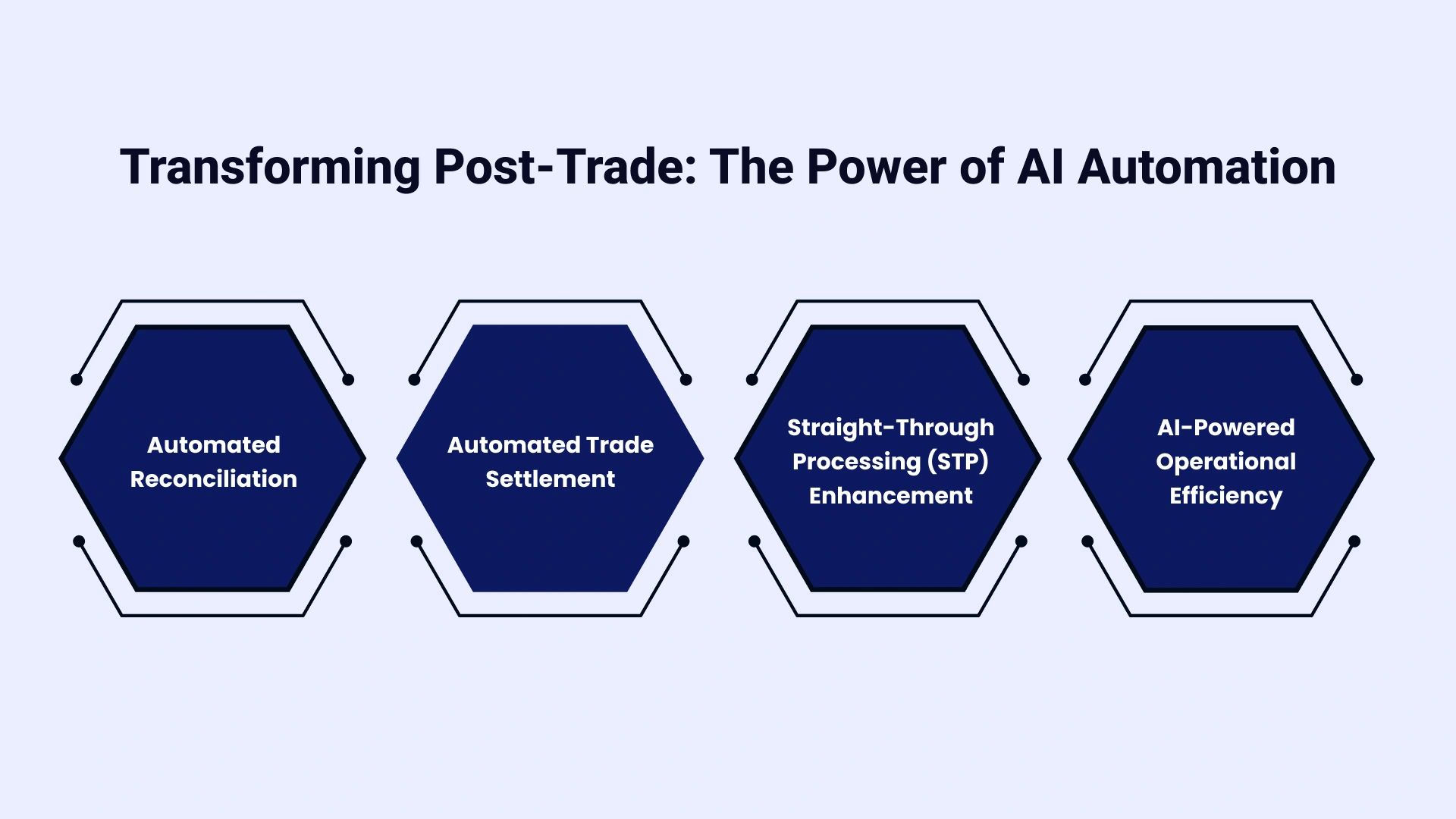
- Automated Reconciliation: GenAI analyzes vast quantities of data from confirmations, trade files, and custodian statements to facilitate accurate reconciliation. It can intelligently identify and resolve discrepancies (breaks) instantly, significantly reducing manual intervention and accelerating the reconciliation process. This dramatically improves AI-powered operational efficiency.
- Automated Trade Settlement: By leveraging predictive analytics and real-time data, GenAI anticipates potential settlement failures and mitigates them. It triggers immediate alerts and initiates resolution workflows proactively, minimizing delays and associated penalties.
- Straight-Through Processing (STP) Enhancement: Natural Language Processing (NLP) capabilities within GenAI enable the AI to interpret, match, and update data from diverse unstructured documents, emails, and messages, which are often the primary source of delays and errors in post-trade processes. This is a critical component of how GenAI transforms post-trade processes.
- AI-Powered Operational Efficiency: With GenAI handling routine and complex data processing tasks, post-trade teams can scale operations without needing a proportional increase in headcount. This allows human experts to focus on complex exceptions, strategic initiatives, and value-added activities, rather than mundane checks.
GenAI's Transformative Impact
| Activity | With Generative AI Post-Trade Operations | Without GenAI (Traditional) |
| Reconciliation | 90% automated, with exception handling suggested by AI and detailed insights. | Approximately 30% manual, leading to high repeat investigations and delays. |
| Regulatory Reporting | Real-time generation and filing, highly adaptable to new mandates. | Manual compilation, higher risk of errors, and significant time investment. |
| Settlement | Predictive, error-preventing, with real-time reporting and proactive issue resolution. | Frequent delays, higher operational losses due to manual intervention points. |
Early adopters of AI for capital markets operations are already realizing substantial benefits, including lower operational costs, faster and more reliable settlements, significantly reduced operational risk, and ultimately, higher satisfaction for institutional investors and clients. This illustrates the profound impact of generative AI for financial services in the back office.
Challenges and Considerations in GenAI Adoption
While the benefits of GenAI in capital markets are profound, the deployment of this sophisticated technology presents real-world complexities and challenges that require careful consideration.
Data Governance & Regulatory Concerns
The financial services industry is built on trust and stringent regulations, making data handling paramount:
- Sensitive Data Management: Artificial intelligence in financial services relies on vast amounts of data, much of which is sensitive. Ensuring that this data is accurately sourced, meticulously anonymized, securely stored, and properly managed throughout its lifecycle is non-negotiable. Any lapse can lead to severe regulatory penalties and reputational damage.
- Model Transparency and Explainability: Financial regulators worldwide are increasingly demanding that decisions made by AI, particularly GenAI, are auditable, non-biased, and explainable. This concept, often referred to as "explainable AI (XAI)," requires that institutions can clearly articulate how an AI model arrived at a particular decision, rather than operating as a "black box." This is a key component of a robust AI risk management framework.
Managing AI Model Risks
The inherent nature of AI, especially GenAI, introduces new types of risks:
- Robust AI Risk Management Frameworks: These frameworks are essential for identifying, assessing, and mitigating the unique risks associated with AI systems in high-stakes environments. This includes addressing issues such as data bias, model drift, adversarial attacks, and the potential for "hallucinations" (where AI generates plausible but incorrect information).
- Ongoing Human Oversight: Despite advanced automation capabilities, the adoption of critical AI in financial services requires continuous human oversight. This is particularly crucial when GenAI output directly drives key compliance decisions, risk assessments, or trade executions. Humans must remain "in the loop" for validation and intervention.
- Balancing Innovation with Established Best Practices: Firms must strike a balance between embracing innovation and adhering to proven risk management principles. This means validating all GenAI-generated reports, rules, and recommendations in parallel with traditional methods until the AI's reliability and accuracy are unequivocally proven.
Proactive Risk Mitigation
Successful AI in Fintech and capital markets isn't just about adopting new tools; it's about integrating GenAI safely and responsibly. This involves:
- Developing and documenting clear procedures for AI deployment and monitoring.
- Ensuring transparent AI model logic and ongoing validation.
- Securing regulatory buy-in and collaboration throughout the implementation process.
Addressing these challenges head-on is vital for maximizing the benefits of artificial intelligence in banking and finance while minimizing potential pitfalls.
The Future of Capital Markets with GenAI
The intersection of GenAI, advanced regulatory technology, and generative AI, combined with data-driven innovation, is fundamentally reshaping how capital markets operate. This is not a distant vision but a rapidly unfolding reality, setting the stage for the next era of financial services.
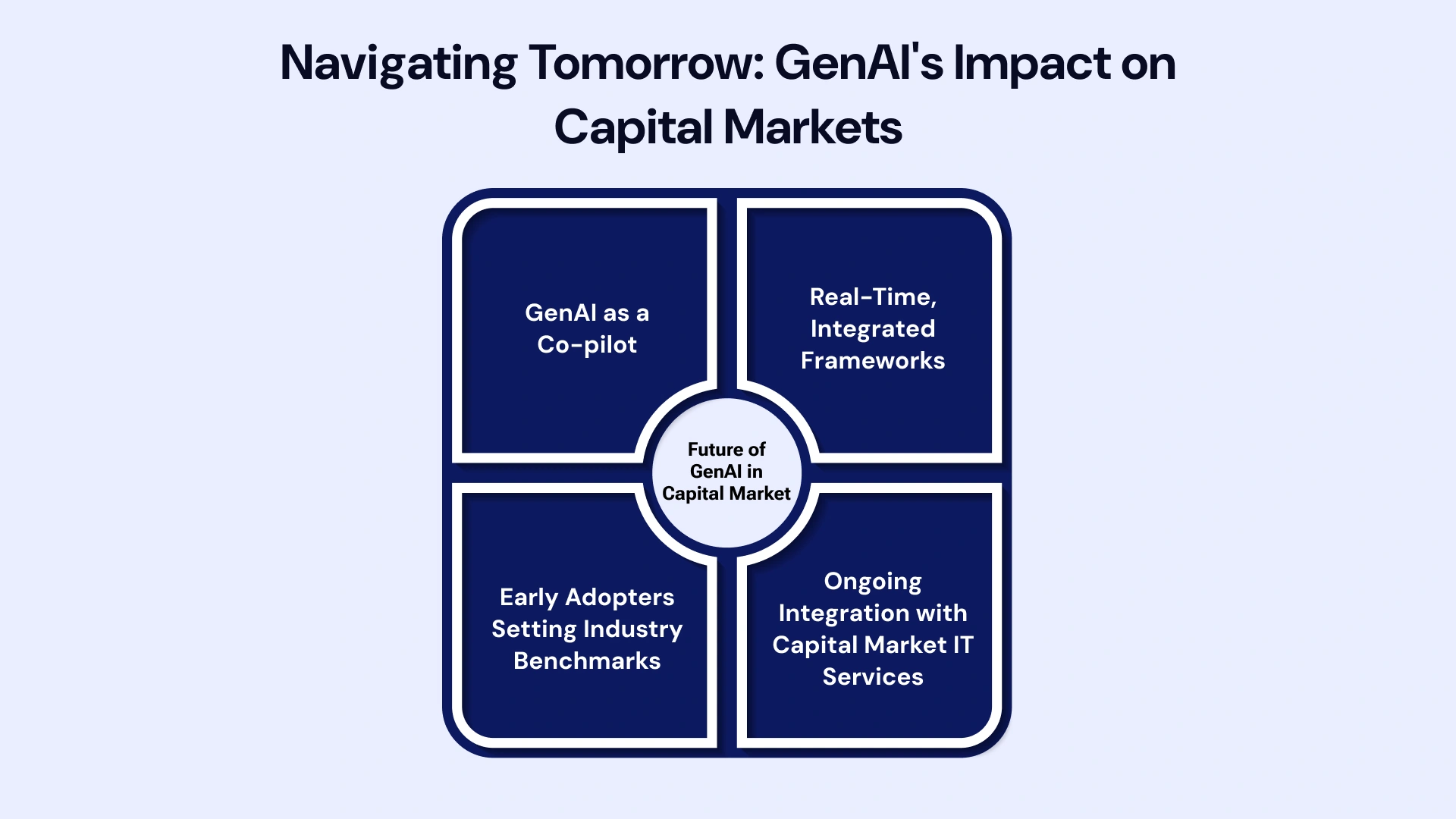
GenAI as a Co-pilot:
Far from replacing human expertise, Generative AI for financial services will increasingly serve as a powerful co-pilot. Virtual advisors will guide compliance professionals through complex regulations, assist risk managers in real-time threat detection, and empower post-trade operations teams with intelligent automation.
This synergistic relationship will unlock unprecedented levels of productivity and insight, allowing human talent to focus on higher-value, strategic tasks.
Real-Time, Integrated Frameworks:
The traditional silos between compliance, risk, and trade operations are dissolving. With AI adoption in financial services accelerating, these functions will blend into an efficient, AI-supervised continuum. AI in financial technology will enable real-time compliance checks integrated directly into trading workflows, proactive risk monitoring that anticipates market shifts, and seamless post-trade processing that minimizes the need for human intervention. This interconnectedness will reduce friction, enhance accuracy, and drive overall resilience.
Early Adopters Setting Industry Benchmarks:
As with any disruptive technology, early adopters of AI in finance industry are already gaining a significant competitive edge. These pioneering firms will not only set new industry benchmarks in terms of speed, accuracy, and client satisfaction but also shape the future standards and best practices for leveraging artificial intelligence in financial services. Their successes will serve as blueprints for industry transformation.
Ongoing Integration with Capital Market IT Services:
The continuous evolution of technology in the financial services industry will necessitate deep and ongoing integration of GenAI with existing Capital Market IT Services. This includes cloud infrastructure, data platforms, cybersecurity solutions, and core banking systems. The ability to seamlessly integrate GenAI into the IT infrastructure will define the next generation of market leaders.
The impact of AI on the world of investing is profound. From algorithmic trading that leverages AI to predict market movements to AI-powered wealth management tools that personalize investment advice, the landscape is being redefined. The benefits of AI in banking are expanding from internal efficiencies to enhanced client experiences and innovative product offerings.
Hence, Generative AI for financial services is not merely a transient trend; it is the fundamental future operating model for capital markets. Those who accelerate its adoption, strategically integrate it into their core processes, and develop robust AI Risk Management Frameworks will claim the largest share of market growth, client trust, and ultimately, sustained leadership in the dynamic global financial landscape.
How VLink GenAI Expertise is Reshaping Capital Markets Operations
The transformative potential of Generative AI in capital markets can only be fully realized with specialized expertise and a proven track record. VLink, as a leader in providing cutting-edge Capital Marketing IT Services, offers comprehensive GenAI solutions explicitly tailored to the complex demands of the financial sector.
Our deep understanding of both technology and financial operations enables us to deliver tangible value across risk, compliance, and post-trade functions. VLink's dedicated team approach to leveraging GenAI for financial services is rooted in practical application and measurable outcomes. We focus on:
- Customized Solution Development: We don't believe in one-size-fits-all. VLink develops bespoke GenAI applications that integrate seamlessly with existing legacy systems, addressing the unique challenges and opportunities of each client's capital markets operations. This includes building specialized LLMs trained on proprietary financial data for enhanced accuracy and relevance.
- End-to-End Implementation & Integration: From initial strategy and proof of concept to full-scale deployment and ongoing support, VLink provides comprehensive services. Our AI development services ensure smooth integration of GenAI capabilities into core banking and trading platforms, minimizing disruption and maximizing ROI. This includes streamlining workflows for generative AI post-trade operations and AI-driven post-trade automation.
- Robust AI Risk Management Framework Implementation: Recognizing the critical need for governance, VLink assists clients in establishing and implementing robust AI Risk Management Frameworks. This ensures that GenAI deployments are compliant, secure, and operate with the necessary transparency and accountability, particularly in sensitive areas such as AI in risk and compliance.
- Accelerating Time to Value: Our focus is on delivering rapid results. By leveraging our pre-built accelerators, industry best practices, and agile development methodologies, we enable financial institutions to quickly pilot, validate, and scale their GenAI initiatives, rapidly realizing the benefits of AI in banking across their operations.
- Expert Consulting & Training: Beyond technology, VLink provides expert consulting to help firms navigate the organizational and cultural shifts required for successful AI adoption in financial services. We also offer tailored training programs to upskill internal teams, ensuring they can effectively manage and leverage GenAI tools to drive business outcomes.
With VLink's proven expertise in AI in fintech and deep industry knowledge, capital markets firms can confidently embark on their GenAI transformation journey, moving beyond theoretical discussions to achieve concrete improvements in efficiency, accuracy, and competitive standing.
Conclusion
With the rapid advancement of AI adoption in financial services, North American capital markets are at a pivotal inflection point. GenAI in capital markets is revolutionizing everything from proactive risk management to efficient regulatory compliance and streamlined post-trade execution. Early adopters have unequivocally proven that generative AI post-trade operations and AI-driven post-trade automation deliver transformative results: less risk, increased speed, and significantly higher ROI.
If you're ready to future-proof your operations with cutting-edge GenAI financial compliance solutions, now is the time to act. Tap into the next era of finance – an era built on intelligence, automation, and continuous innovation. Contact our experts today to discuss your GenAI transformation strategy and accelerate your journey to market leadership.










 Shivisha Patel
Shivisha Patel

















